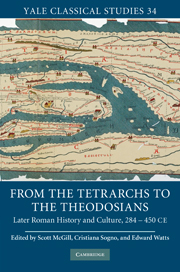Book contents
5 - Constantine answers the veterans
from PART I - POLITICS, LAW, AND SOCIETY
Published online by Cambridge University Press: 04 August 2010
Summary
Moments of high drama are not normally the stuff of law codes. But the compilers of Theodosius's Code have preserved for us a dramatic encounter between the emperor Constantine and his veterans that reveals insights into the development of both imperial hearings and the recording of them in the early years of the fourth century, a century often characterized by drama and ceremony. As I hope to show, the exchange demonstrates important continuities in the basic structure of hearings from earlier in the principate and also reflects the increasing use of organized acclamation at emperors' public appearances. Yet the form of the exchange is not duplicated in our extant evidence, and records of later imperial hearings did not follow its model precisely; rather they demonstrate that while the conduct of hearings may have undergone gradual developments, records of them did not develop in parallel. Constantine's text was a one-off: an extensive edited account of a hearing that was preserved in toto in a legal code. It is possible that its extensiveness and detail were never replicated because this text was preserved not just for its legal content but also for its formalities: in bestowing benefits on veterans who had just fought for him in the year in which he was elevated to Augustus, Constantine was using a legal hearing to demonstrate both his commitment to the military and also the style in which he would govern as emperor.
- Type
- Chapter
- Information
- From the Tetrarchs to the TheodosiansLater Roman History and Culture, 284–450 CE, pp. 93 - 114Publisher: Cambridge University PressPrint publication year: 2010
- 2
- Cited by



